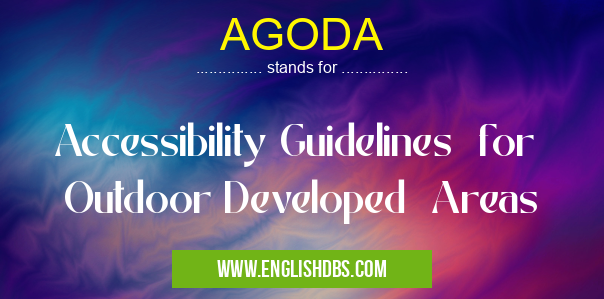What does AGODA mean in PARKS
AGODA stands for Accessibility Guidelines for Outdoor Developed Areas. It is a set of guidelines developed by the US Access Board to ensure that people with disabilities have access to outdoor recreational facilities. These guidelines help improve accessibility and mobility for people with disabilities in a variety of outdoor spaces, including parks, trails, playgrounds, picnic areas, and campgrounds. The AGODA standards cover physical access to these areas as well as communication & information access.

AGODA meaning in Parks in Community
AGODA mostly used in an acronym Parks in Category Community that means Accessibility Guidelines for Outdoor Developed Areas
Shorthand: AGODA,
Full Form: Accessibility Guidelines for Outdoor Developed Areas
For more information of "Accessibility Guidelines for Outdoor Developed Areas", see the section below.
What does AGODA Stand for?
The full form of AGODA is Accessibility Guidelines for Outdoor Developed Areas. It was first published by the United States Access Board in 2006 and updated in 2014. It provides guidance on improving accessibility and mobility for people with disabilities in parks, trails, playgrounds, picnic areas, and campgrounds through physical access standards, communication & information standards, sign standards and parking standards.
What are the guidelines of AGODA?
The Accessibility Guidelines for Outdoor Developed Areas (AGODA) provides detailed requirements on how outdoor spaces should be designed or constructed in order to meet the needs of individuals with disabilities. The guidelines include recommendations on width measurements for walkways and trails; an increased number of accessible routes; improved signage; improved tactile features; improved parking spaces; improved lighting designs; and an increased number of rest stops along trails or pathways. The AGODA guidelines also address communication & information requirements such as providing Braille signs at all entrances/exits or providing audio description systems in certain cases.
Essential Questions and Answers on Accessibility Guidelines for Outdoor Developed Areas in "COMMUNITY»PARKS"
What is the purpose of the Accessibility Guidelines for Outdoor Developed Areas?
The Accessibility Guidelines for Outdoor Developed Areas (AGODA) are a set of guidelines designed to ensure that public outdoor areas are accessible to people of all abilities. AGODA focuses on providing physical access to recreational opportunities, while also considering features such as communication and navigational aids. The goal of AGODA is to create pleasant, safe, and fully accessible outdoor environments for everyone.
Does AGODA cover indoor spaces?
No, AGODA only applies to outdoor developed areas such as parks, trails, sports fields, swimming pools, campgrounds, etc.
How does AGODA ensure accessibility in outdoor spaces?
AGODA provides guidance on improving access through various elements, including signage and wayfinding systems; universal design elements such as ramps and wide paths; tactile paving; accessible seating; support services and amenities; and more. It also outlines specific provisions for different types of recreation opportunities like camping or boating.
Who is responsible for implementing AGODA in outdoor spaces?
Generally speaking, local governments are responsible for implementing the standards outlined by AGODA within their jurisdiction. However other entities such as private businesses or organizations may also be responsible for adhering to these guidelines in certain cases.
Are there any exceptions to the requirements set forth by AGODA?
Yes, there are several exceptions that allow facilities some flexibility when it comes to meeting the requirements outlined by AGODA. These include allowances for limited resources or financial hardship, structural constraints due to existing conditions or development processes, and minor deviations from specific technical criteria if alternative designs provide equivalent levels of access.
Are there any penalties associated with not following AGODA?
Yes, failure to comply with the standards set by AGODAG could result in legal action taken against the facility by people with disabilities who experience decreased access due to non-compliance. It is important that facilities take actionable steps towards achieving compliance with LLGDA in order to avoid potential penalties or fines.
Is there any way I can keep up with changes made to guidelines in regards of accessibility?
Yes! You should check out both your local government's website as well as sites like Disability Rights Education & Defense Fund (DREDF), which will often have updated information regarding new laws related to accessibility measures and guides on how best ot implement them within your jurisdiction.
Are there any resources available which discuss how I can go beyond what's provided bythe Accessibility Guidelines for Outdoor Developed Areas?
Yes! There are many resources available online discussing best practices when it comes to going beyond basic compliance requirements outlined by LGGDA - such as offering additional accommodations like tactile maps or audio tours - in ordero further promote inclusionary accessibly within outdoor spaces.
What kind of feedback has been received regarding implementation of Accessibility Guidelines for Outdoor Developed Areas?
Based on feedback received thus far following implementation of Accessibility Guidelines For Outdoor Developed Areas (AGOODA), individuals with disabilities generally report feeling more empowered than they did prior - having improved access options better enables them o participate in recreational activities alongside their peers without being hindered by disability-related obstacles.
What kinds of modifications have been made since implementation oft heAccessibility Guidelines for Outdoor Developed Areas originally came into effect?
Since its initial implementation , numerous revisions have been made ot ensure greater compliance with changing preferences or requests from stakeholders – this includes updates regrading language used throughout documentation regarding disabled persons’ nomenclature as well as adjustments made towards features based on feedback collected from user-testing sessions conducted amongst individuals with disabilities.
Final Words:
The Accessibility Guidelines for Outdoor Developed Areas (AGODA) are an important tool for ensuring that individuals with disabilities have equal access to outdoor recreational facilities. The guidelines include physical access standards, communication & information standards, sign standards and parking standards that must be adhered to when constructing or designing outdoor spaces in order to make them accessible to all users. Having these guidelines available helps create inclusive communities where everyone can enjoy nature safely and conveniently regardless of their abilities.
